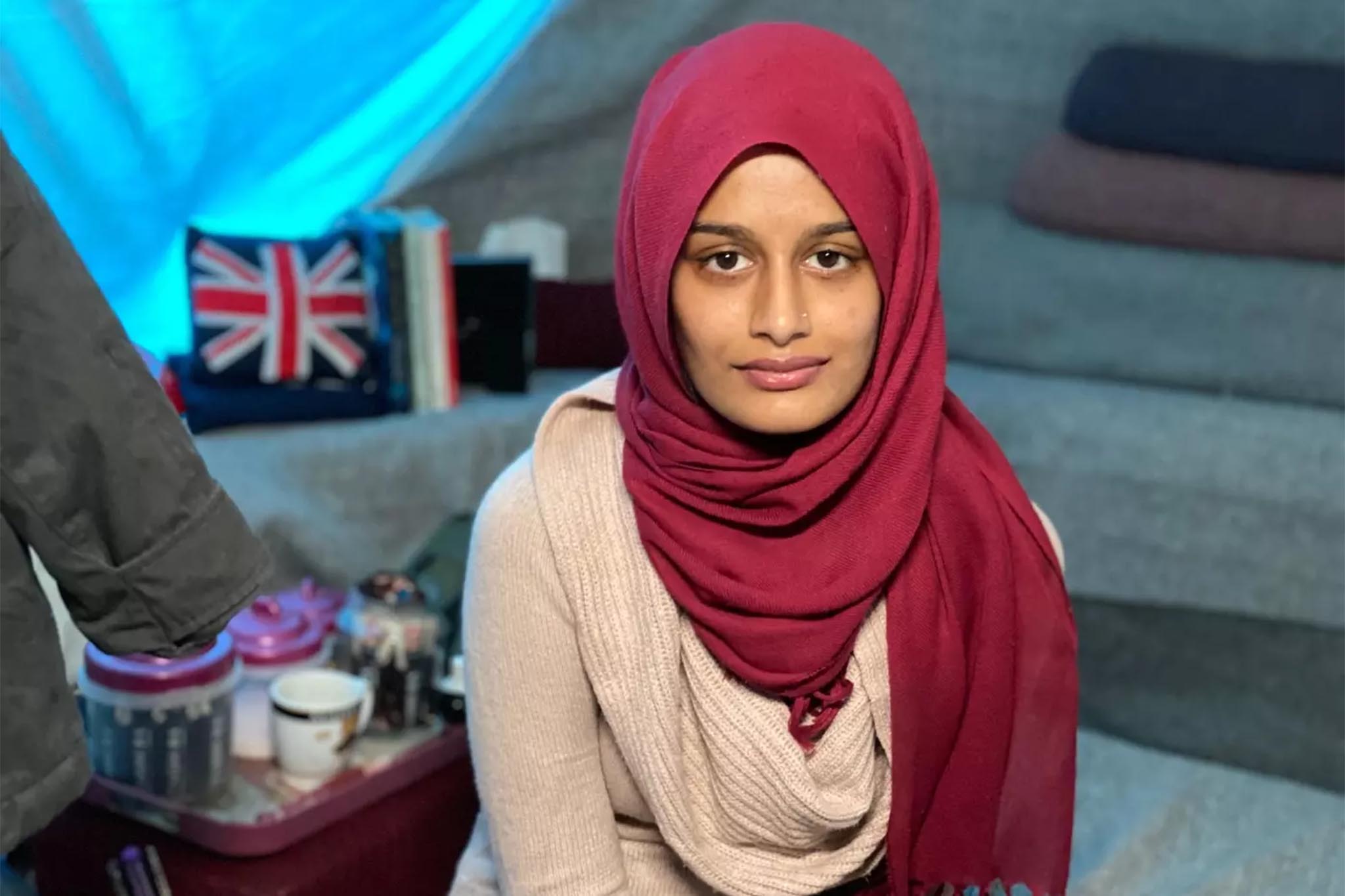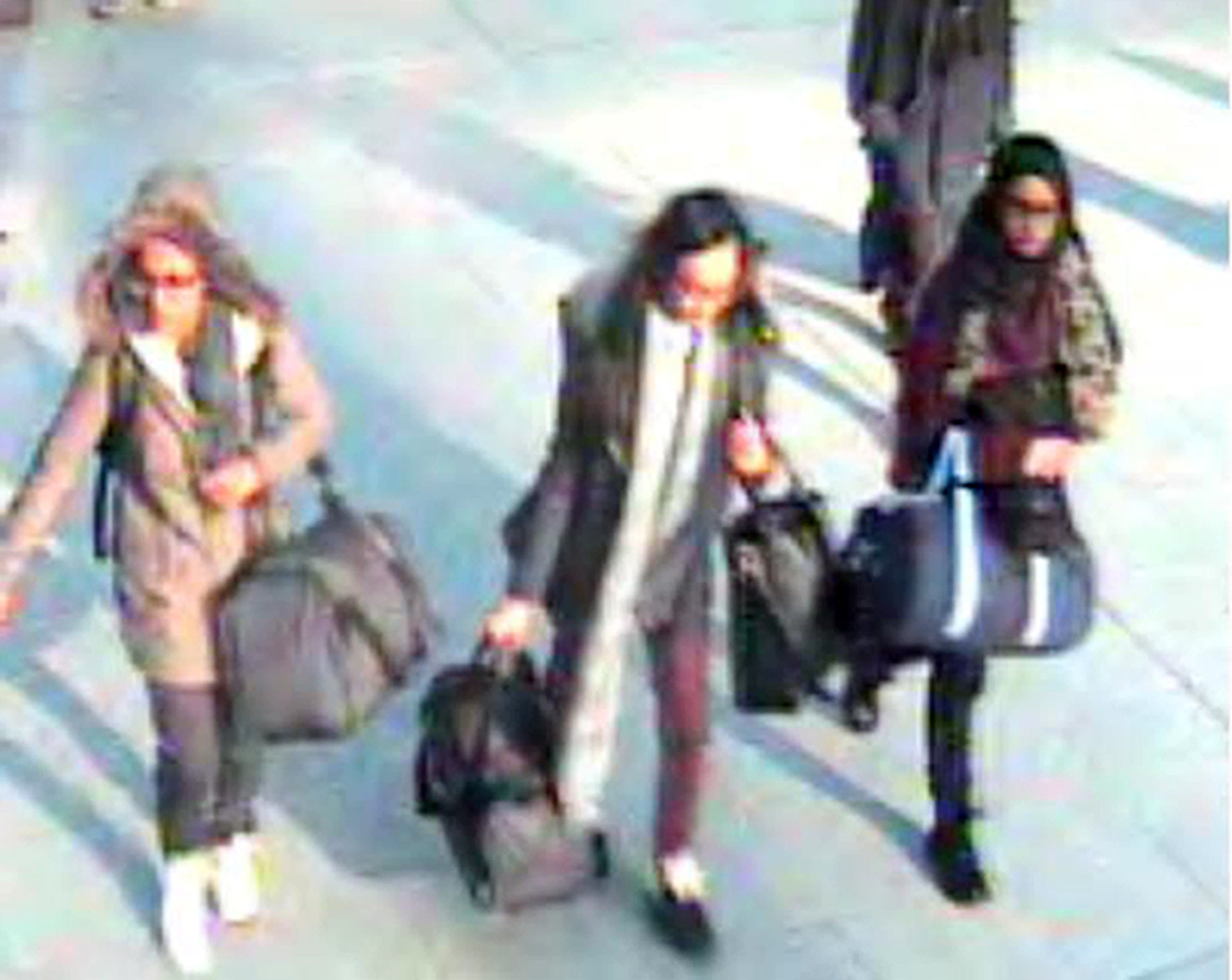Inside story of ‘jihadi bride’ Shamima Begum’s appeal against losing her British citizenship
As she loses her bid to restore UK citizenship, Duncan Gardham revisits the controversial case of ‘jihadi bride’ Shamima Begum

Shamima Begum was the “jihadi bride” from East London who joined Isis at the age of 15 and was found in a refugee camp in Syria, where she begged to be allowed to return home.
Her discovery – with the words “I’m a Bethnal Green girl” – provoked headlines across the world and fevered speculation about what she had been doing for the past four years. Unnamed sources claimed she had been a member of a female Isis enforcement squad or had been sewing vests for suicide bombers.
Facts were harder to come by. Begum and her two school schoolfriends, Kadiza Sultana, 16, and Amira Abase, 15, left Britain on a Turkish Airlines flight from Gatwick to Istanbul at 12.40pm on Tuesday 17 February 2015.
Images of them passing through passport security in trainers and Western clothing – Begum using her older sister’s passport and wearing a headscarf – went around the world, after police released them, three days later, amid a desperate search to stop them crossing into Syria.
The girls had funded the trip by stealing gold jewellery from their families and then paid more than £1,000 in cash to a travel agent in east London for the plane tickets to Turkey, police said later.
Everyone had an opinion on Begum then and most still do now. Her case is one of those that divides people: “She knew exactly what she was doing, she made her bed, she must lie in it” versus the more forgiving, “How can a 15-year-old girl make a decision to join Isis? She must have been groomed.”
In essence, that is the argument that played out over two days in the Court of Appeal in October and on which today’s ruling against her rested.

What happened to Begum in Syria?
When Begum passed through passport control on that day in 2015, had she thoroughly researched and understood Isis and everything it stands for, or had she been groomed online for sexual exploitation by the enablers of a brutal terrorist group?
Begum was captured in January 2019 – following the collapse of Isis – and taken to al-Hawl detention camp, before being transferred to al-Roj camp, where she disavowed the terrorist group, returned to wearing Western clothing and said she wanted to return home.
Begum married Yago Riedijk, a Dutchman she had never met before, on 20 February 2015, 10 days after her arrival in Syria. The couple had three children, two of whom died of disease or malnutrition, and a third, born after her capture, died of pneumonia.
And that is about all we know for sure. Most women who joined Isis had no active role in the group and Begum did not speak Arabic. A BBC investigation suggested she and Riedijk had been housed by a middle-ranking member of Isis but it appears her husband fell out with the group and was arrested for being a spy, then later released.
She is the only one of the three friends to have survived the conflict – both the others married fighters but Abase is thought to have been killed in a Western missile strike in October 2015 and Sultana in May 2016. After her escape from Baghuz, where Isis made their last stand, Begum was stripped of her British citizenship on the grounds of national security in February 2019 by Sajid Javid, then the home secretary, amid a political row over whether she was a dual British and Bangladeshi citizen.

Begum’s appeal: the case for and against
The case pits two of the country’s leading teams of lawyers against each other. Birnberg Peirce is one of Britain’s leading human rights law firms with a formidable track record of pursuing every legal avenue for their clients, many of them accused of terrorism offences, dating back to the days of the IRA and now including Islamist defendants.
Sir James Eadie, the treacle-voiced King’s Counsel for the Home Office and MI5, has been in more secret hearings than many barristers have been in open ones and knows that the laws on national security offer the utmost protection to decisions made by the government.
A series of legal precedents that demand respect for those decisions stand between Begum and her bid to return to her home country.
Dan Squires KC and Samantha Knights KC, the leading barristers instructed by Birnbergs, told the court in October the decision to deprive Begum of her citizenship was not “proportionate” to the risk she posed.
They argue Begum was “cynically recruited and groomed” by Isis, so that she could be “married off” to an older man, within days of arrival in their territory.
During a five-day hearing last year in front of the Special Immigration Appeals Commission (SIAC), Squires told the panel: “The evidence is overwhelming that she was recruited, transported, transferred, harboured and received in Syria by Isis for the purpose of sexual exploitation and marriage to an adult male.
“In doing so, she was following a well-known pattern by which Isis cynically recruited and groomed female children, as young as 14, so that they could be offered as wives to adult men.”
He added: “It is clear that Isis deliberately and successfully recruited underage girls for the purpose of sexual exploitation and in particular for the purpose of child marriage – which, under international law, is considered a forced marriage – and the bearing of children, which was an important feature of its state-building project.”
Sir James, for the government, said Begum travelled to Syria “with her eyes open” to the ideology of Isis and their “uncompromising brutality”.
He told the panel: “You can be trafficked in the most ghastly, unacceptable way, exposed in the most unacceptable way, desensitised in the most unacceptable way and yet unfortunately still be a security threat.”
He said: “If they do pose such a danger, how they came to pose that danger is not important. What matters is that they do in fact pose such a danger.”
The case would seem to have been half-won by Begum when Mr Justice Jay handed down a ruling in February.
The commission acknowledged what we all know – that “reasonable people” who know all the facts still differ on whether Begum’s trip to Syria was voluntary and whether it was safe for her to return. And the commission recognised the “considerable force” in submissions advanced on behalf of Begum that the home secretary’s conclusion that she travelled voluntarily to Syria was “as stark as it is unsympathetic”.
“Essentially, and from the perspective of those responsible for the trafficking, the motive for bringing her to Syria was sexual exploitation to which, as a child, she could not give a valid consent,” they said.
However, the judge and his panel added, the existence of a “credible suspicion” that Begum had been trafficked was not sufficient for her to succeed in her appeal.
Under our constitutional settlement the “sensitive issues” of national security are for the secretary of state to evaluate and not for the commission, they added. “The question for the commission is whether the secretary of state, on advice, came to a conclusion which was reasonably open to him in the light of all the available evidence,” they said.
Begum’s lawyers were more than a little upset and called it an “extraordinary judgment”. Daniel Furner for Birnbergs said they would appeal, adding: “The legal fight is nowhere near over.”
At the Court of Appeal, they also argued that the decision to deprive Begum of her British citizenship effectively made her stateless, stranded in northern Syria with no prospect of ever leaving.
Professor Ridwanul Hoque, an expert on Bangladeshi constitutional law in Dhaka, accepted at an immigration commission hearing for Begum four years ago that Bangladeshi law was “contradictory in places” and had not been the subject of much “judicial analysis.”
However, after days of arcane argument over the laws of east Pakistan in 1972, it was decided that Begum was also a Bangladeshi citizen because her parents were born there, even though she had never been to the country, did not have a passport and had never applied for citizenship.
Her lawyers argue, with some justification, that she is now “de facto” stateless because Bangladesh does not recognise her as a citizen and has no intention of allowing her to enter their country.
Ultimately, the legal test is whether the home secretary could have foreseen that at the time, not whether it is what happened.

Have other countries taken back family members of Isis fighters?
Even if Begum had regained her British citizenship, the British government does not want her back and will do nothing to encourage the Western-backed Kurdish forces in northern Syria to release her from the camp where she is now held.
In that sense, she is in the same situation as an unknown number of British men – over whom there has been no argument about grooming and no argument about what should be done with them, such as Aseel Muthana from Cardiff and Jack Letts from Oxford.
Last year, the International Centre for the Study of Radicalisation (ICSR) held a conference in London to discuss what to do with these prisoners held in legal limbo, a Guantanamo for the 2020s.
Ian Moss, the US deputy coordinator for counterterrorism, told the conference that Britain and others had a “moral and strategic imperative” to accept the return of their nationals who fought for Isis.
The Americans believe the prisoners are an enduring threat where they are held. Attempts have been made to break them out of the makeshift prisons where they are held and no effort is being made, in the case of the young men, to deradicalise them and prepare them for a life after jihad.
Canada has repatriated some of the families of Isis fighters, along with France, Germany, Spain, and Sweden but the fighters themselves are another matter.
The British government sees it as a low-risk option to leave them where they are. There is an argument that they committed their crimes in Syria and that is where they should stand trial and serve their time but there are no tribunals being held for the members of Isis and no move to institute them.
The Kurds have no love for Isis, who took delight in killing and mutilating male and female Kurdish soldiers, often on camera, but they will not hold the prisoners forever, and when they are released, those that retain their British citizenship will be sent home.
The US thinks the least risky option is to face up to that now; the British government disagrees.
To some, the term “jihadi bride” is insulting because it implies that the “bride” had no “agency” and was “less ideological and less dangerous”. In reality, experts like Sofia Koller argue that women have played a crucial role in the abuse of Yazidi sex slaves. There is no suggestion that Begum did this, nor any real evidence about what she did do when she was in Syria.
However, she effectively joined Isis and has lost three children, partly as a result of the Western aerial onslaught of Raqqa and Baghuz in Syria. It would not be surprising if she bore some resentment. Returning her home is not a risk-free option. Women have launched terrorist attacks or attempted to do so, before. In the case of Rizlaine Boular, who purchased a knife and rehearsed an attack on a police officer in a flat in Harlesden, north London, she was driven on by having her daughter taken into care.
The question is whether Begum remains our responsibility. Her case has already been to the Supreme Court once – when her lawyers argued that she should be allowed back to Britain to give evidence in her appeal. In that case, she won in the Court of Appeal, only for the decision to be overturned in the Supreme Court.
Begum herself made a plaintive plea to return in interviews broadcast earlier this year by the BBC, saying: “I’m not this person that they think I am being perceived as in the media, you know. I’m just so much more than Isis and I’m so much more than everything I’ve been through.”
Join our commenting forum
Join thought-provoking conversations, follow other Independent readers and see their replies
Comments
Bookmark popover
Removed from bookmarks